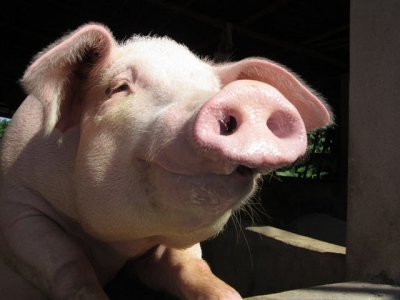Sows under stress: Antioxidant supplement may help reproductive performance

Evidence stacks up for sow supplementation with cellular antioxidants as latest research from Lallemand Animal Nutrition shows benefits for reproductive performance.
Lallemand Animal Nutrition has built on a 2013 study in which sow supplementation with cellular antioxidants was shown to improve piglet maturity and litter homogeneity at birth, with new research that also demonstrates benefits for piglet health at birth and sow reproductive performance.
The research lends support to the practice of supplementing sows’ diets during the weaning-to-estrus interval with a combination of Lallemand’s Melofeed, which is naturally rich in the primary cellular antioxidant superoxide dismutase (SOD), and Alkosel, an organic selenium source.
“This combination of SOD and selenium yeast is widely used in some countries, and farmers all over the world have reported similar results. An interesting observation made by farmers is that estrus signs are more visible with this specific blend,” Monika Korzekwa, antioxidant & mycotoxin product manager at Lallemand Nutrition, told this publication.
Linking performance with profit
She added: “Our mission is to show clients all over the world that specific combinations of highly efficient ingredients – when supplied in a specific period (in this case during five days for weaning-to-estrus only), can improve the profitability of a farm tremendously.”
Genetic selection for highly prolific sows has led to increased litter sizes along with a higher incidence of immature piglets and heterogenic litters in general, causing concerns for pig producers. Because of their high reproductive performance, hyperprolific sows are subject to oxidative stress, leading to an increase in the production of reactive oxygen species causing cellular damage. This damage can prevent embryo implantation.
The previous study demonstrated a beneficial effect of Alkosel and Melofeed with vitamins in the sows’ weaning-to-estrus period on the percentage of immature piglets per litter and on the homogeneity of intra-litter birth weights (Le Treut et al. 2013).
The purpose of this latest study was to test the effect of supplementation with this blend of antioxidants during the weaning-to-estrus interval on the reproductive performance of sows in the subsequent cycle. The trial was conducted from July 2017 to January 2018 on a commercial farm in Germany.
Study design
At weaning, 429 sows were fed either a control diet or a diet containing an 8g supplement of superoxide dismutase (SOD), organic selenium and vitamins, for five consecutive days corresponding with the weaning-to-estrus interval. There were 241 sows in the control group and 188 were fed the antioxidant supplement.
The sows on the supplemented diet showed improved return to estrus and farrowing rates in the subsequent cycle (94% versus 87% in the control group). In addition, they gave birth to more piglets, with significantly more alive piglets (14.98 versus 14.24 in the control group) and fewer stillborn piglets.
The researchers concluded that supplying sows with an antioxidant blend during the weaning-to-estrus period benefits reproductive performance.
Korzekwa said that the next step in this research will be targeting the semen quality of boars.
“We strongly believe that supplementation with Melofeed and Alkosel will be beneficial. We have already observed great effects in male broiler breeders and in equine,” she said.
The study was presented as a poster at the 51st Journées de la Recherche Porcine in February 2019, but has not been peer-reviewed.
Related news
 How sow nutrition impacts gestation, milk production
How sow nutrition impacts gestation, milk production Industry experts discuss the impact of nutrition during various times in gestation and milk production
 New swine research center offers industry insights
New swine research center offers industry insights The facility could potentially help producers achieve their production goals, increase profitability, reduce risk and improve their overall competitive
 Pig nutrition study may prevent future PEDv outbreaks
Pig nutrition study may prevent future PEDv outbreaks Kansas State University has finished a study that may improve swine nutrition and prevent deadly viruses